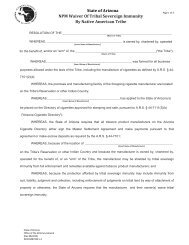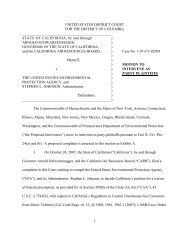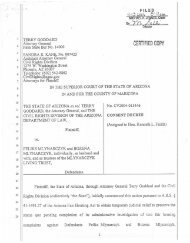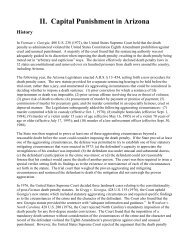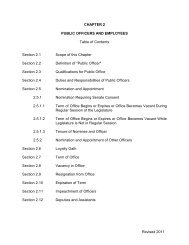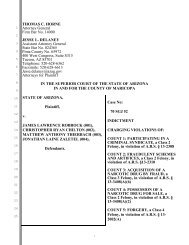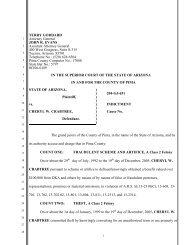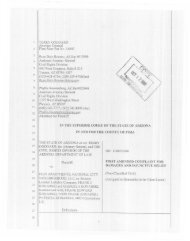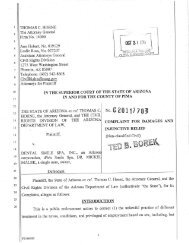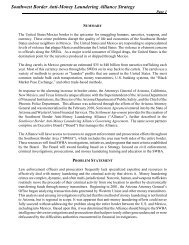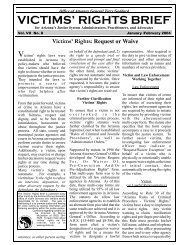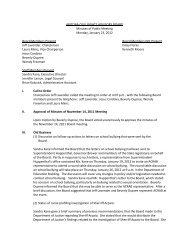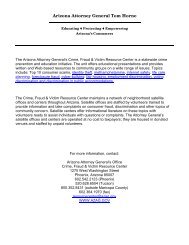Arizona Attorney General Terry Goddard 2010 Annual Report
Arizona Attorney General Terry Goddard 2010 Annual Report
Arizona Attorney General Terry Goddard 2010 Annual Report
You also want an ePaper? Increase the reach of your titles
YUMPU automatically turns print PDFs into web optimized ePapers that Google loves.
Criminal Division (continued)<br />
counts of first-degree premedi-<br />
State v. Cayeros<br />
body was found in the desert;<br />
State v. Guillen<br />
aggravated assault, two counts<br />
tated murder. Judge Michael D.<br />
Ryan, now on the <strong>Arizona</strong> Supreme<br />
Court, sentenced King to<br />
death for each of the murders.<br />
The <strong>Arizona</strong> Supreme Court affirmed<br />
his convictions and death<br />
sentences.<br />
For the next decade and half,<br />
the King case was appealed<br />
through the state and federal<br />
courts. Finally in March 2009,<br />
the U.S. Supreme Court declined<br />
to hear the case for the second<br />
time. When the State moved<br />
for Warrant of Execution shortly<br />
afterwards, King responded that<br />
he would file a post-conviction<br />
relief petition challenging <strong>Arizona</strong>’s<br />
lethal injection protocol.<br />
The trial court dismissed King’s<br />
petition in March <strong>2010</strong>. King<br />
recently asked the <strong>Arizona</strong><br />
Supreme Court to review that<br />
decision.<br />
Johnny Daniel Cayeros was<br />
a gang leader in the Grant<br />
Park neighborhood of South<br />
Phoenix. In March 2001, he<br />
shot John Flores multiple times<br />
with a shotgun. In addition to<br />
killing Flores, he injured two<br />
other people, Ray Osuna and<br />
Mark Barehand. The State was<br />
unable to take the case to trial<br />
until an additional eyewitness<br />
came forward five years ago<br />
and placed the shotgun in<br />
Cayeros’ hands. The Court of<br />
Appeals has not decided his<br />
appeal.<br />
Spears v. Ryan<br />
In 1991, Anthony Spears came<br />
to <strong>Arizona</strong> to visit Jeanette<br />
Beaulieu, who considered herself<br />
Spears’ girlfriend (although<br />
Spears was actually living with<br />
a woman in San Diego). Spears<br />
returned to California with items<br />
that belonged to Jeanette and<br />
was driving her truck. Jeanette’s<br />
nearby was a shell casing identified<br />
as having been fired from<br />
Spears’ gun. He was convicted<br />
of murder and sentenced to<br />
death. Spears raised 17 claims<br />
in his federal habeas petition.<br />
On September 14, 2009, the<br />
district court denied Spears’<br />
requests for evidentiary development,<br />
denied all of his claims,<br />
and dismissed the habeas<br />
petition. The case is currently<br />
pending in the Ninth Circuit.<br />
Poyson v. Ryan<br />
On January 20, <strong>2010</strong>, District<br />
Court Judge Neil Wake denied<br />
Robert Allen Poyson’s federal<br />
habeas corpus petition. Poyson<br />
received three death sentences<br />
in connection with the brutal<br />
killings of Leta Kagen, Robert<br />
Delahunt, and Roland Wear<br />
in 1996 in Mohave County.<br />
Poyson’s appeal is currently<br />
pending before the Ninth Circuit<br />
Court of Appeals.<br />
The case involved a canine sniff<br />
conducted on the exterior of<br />
Jose Guillen’s residence which<br />
uncovered the presence of<br />
marijuana. The police searched<br />
the residence after getting the<br />
consent of his wife. The case<br />
presented an issue of first<br />
impression in <strong>Arizona</strong>, whether<br />
the state right to privacy in the<br />
circumstances of this case afforded<br />
greater protections than<br />
the Fourth Amendment to the<br />
U.S. Constitution. Ultimately the<br />
State won the case because the<br />
court found the wife’s consent<br />
to have been valid.<br />
State v. Far West Water &<br />
Sewer, Inc.<br />
The <strong>Arizona</strong> Court of Appeals<br />
affirmed the convictions and<br />
sentences of Far West Water<br />
and Sewer, Inc., an <strong>Arizona</strong> Corporation,<br />
for negligent homicide,<br />
of endangerment, and violating<br />
a safety standard or regulation<br />
that caused the death on<br />
an employee. The convictions<br />
arose out of an incident at a<br />
sewage collection and treatment<br />
facility owned and operated by<br />
Far West in which two people<br />
died and a third suffered serious<br />
injuries after being overcome by<br />
hydrogen sulfide gas. The court<br />
also affirmed the convictions of<br />
Brent Weidman, the president<br />
and chief executive officer of<br />
Far West, on two counts of negligent<br />
homicide and two counts<br />
of endangerment arising out of<br />
the same incident.<br />
State v. Soliz<br />
Article 2, Section 23 of the<br />
<strong>Arizona</strong> Constitution requires<br />
that “juries in criminal cases in<br />
which a sentence of imprisonment<br />
for 30 years or more is<br />
authorized by law shall consist<br />
of 12 persons.” Given the com-<br />
<strong>Arizona</strong> <strong>Attorney</strong> <strong>General</strong> <strong>Terry</strong> <strong>Goddard</strong> • <strong>2010</strong> <strong>Annual</strong> <strong>Report</strong><br />
18



